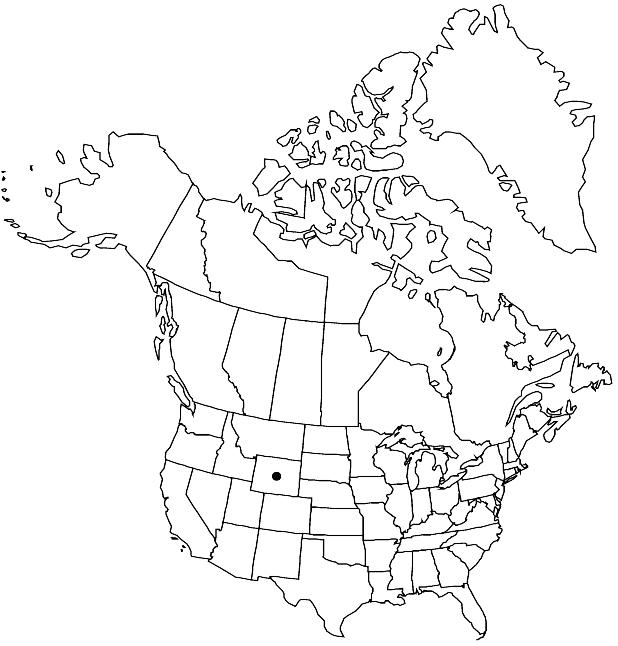Difference between revisions of "Boechera pusilla"
Vasc. Pl. Wyoming ed. 3, 376. 2001.
FNA>Volume Importer |
imported>Volume Importer |
||
| (6 intermediate revisions by 2 users not shown) | |||
| Line 7: | Line 7: | ||
|year=2001 | |year=2001 | ||
}} | }} | ||
| − | |basionyms={{Treatment/ID/ | + | |basionyms={{Treatment/ID/Basionym |
|name=Arabis pusilla | |name=Arabis pusilla | ||
|authority=Rollins | |authority=Rollins | ||
| + | |rank=species | ||
| + | |publication_title=Contr. Gray Herb. | ||
| + | |publication_place=212: 107. 1982 | ||
}} | }} | ||
|synonyms= | |synonyms= | ||
| Line 27: | Line 30: | ||
|distribution=Wyo. | |distribution=Wyo. | ||
|discussion=<p>Of conservation concern.</p><!-- | |discussion=<p>Of conservation concern.</p><!-- | ||
| − | --><p>Morphological evidence suggests that Boechera pusilla is an apomictic species that arose through hybridization between B. lemmonii and B. pendulina; it is known only from the type locality in southwestern Wyoming.</p> | + | --><p>Morphological evidence suggests that <i>Boechera pusilla</i> is an apomictic species that arose through hybridization between <i>B. lemmonii</i> and <i>B. pendulina</i>; it is known only from the type locality in southwestern Wyoming.</p> |
|tables= | |tables= | ||
|references= | |references= | ||
| Line 36: | Line 39: | ||
-->{{#Taxon: | -->{{#Taxon: | ||
name=Boechera pusilla | name=Boechera pusilla | ||
| − | |||
|authority=(Rollins) Dorn | |authority=(Rollins) Dorn | ||
|rank=species | |rank=species | ||
| Line 51: | Line 53: | ||
|publication year=2001 | |publication year=2001 | ||
|special status= | |special status= | ||
| − | |source xml=https:// | + | |source xml=https://bitbucket.org/aafc-mbb/fna-data-curation/src/2e0870ddd59836b60bcf96646a41e87ea5a5943a/coarse_grained_fna_xml/V7/V7_576.xml |
|tribe=Brassicaceae tribe Boechereae | |tribe=Brassicaceae tribe Boechereae | ||
|genus=Boechera | |genus=Boechera | ||
Latest revision as of 22:34, 5 November 2020
Perennials; long-lived; (cespitose); apomictic; caudex often woody. Stems usually 2–6 per caudex branch, arising from margin of rosette near ground surface, 0.5–2 dm, glabrous or sparsely pubescent proximally, trichomes simple and short-stalked, 2-rayed, to 0.2 mm, glabrous distally. Basal leaves: blade linear-oblanceolate, 1–2.5 mm wide, margins entire, ciliate along petiole, trichomes (simple), 0.4–0.7 mm, surfaces usually sparsely pubescent, rarely glabrous, trichomes short-stalked, 2- or 3-rayed, 0.1–0.4 mm. Cauline leaves: 3–5, not concealing stem; blade auricles 0–0.2 mm, surfaces of distalmost leaves usually glabrous or, rarely, margins sparsely ciliate. Racemes 6–13-flowered, unbranched. Fruiting pedicels horizontal to divaricate-descending, straight or slightly curved downward, 2–5 mm, glabrous. Flowers divaricate-ascending at anthesis; sepals glabrous or sparsely pubescent, trichomes spreading, 2-rayed; petals white to lavender, 4–5 × 1.5–1.8 mm, glabrous; pollen spheroid. Fruits horizontal or divaricate-descending, not appressed to rachis, secund, straight, edges parallel, 1.6–3.2 cm × 1.5–2 mm; valves glabrous; ovules 20–32 per ovary; style 0.1–0.4 mm. Seeds uniseriate, 1.2–1.5 × 0.8–0.9 mm; not winged or with distal wing 0.05–0.1 mm wide.
Phenology: Flowering May–Jun.
Habitat: Cracks and crevices of granitic rock outcrops
Elevation: 2400-2500 m
Discussion
Of conservation concern.
Morphological evidence suggests that Boechera pusilla is an apomictic species that arose through hybridization between B. lemmonii and B. pendulina; it is known only from the type locality in southwestern Wyoming.
Selected References
None.
